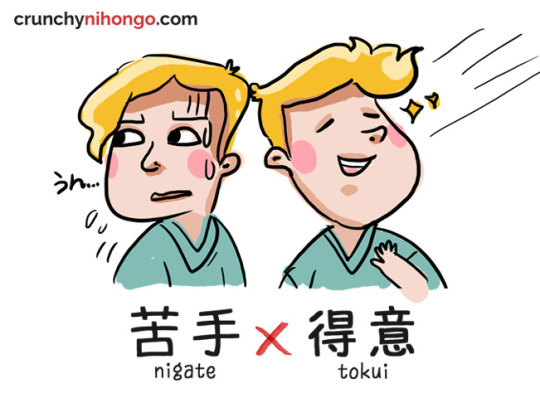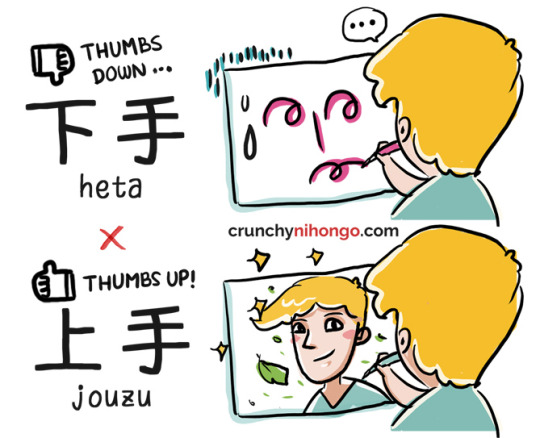Text
What is the difference between 苦手 nigate and 下手 heta ?
Today we’re gonna learn the difference between these 2 seemingly similar words: 苦手 (nigate) and 下手 (heta). Both seems to mean “Not good at something”. But if you check out their kanji, you can immediately understand that they have a different kind of nuance.
苦手 (nigate) and 得意 (tokui)

苦手 (nigate) is using 苦 kanji which can means worry, bitter, suffering and hardship. So when this word is being used, it doesn’t mean that someone is unskillful, but they are not comfortable of doing it. The direct antonym of 苦手 (nigate) is 得意 (tokui) which means one’s strong point or one’s specialty. Another meaning (but unrelated with this topic) of 得意 (tokui) is prosperity, pride or frequent costumer.
下手 (heta) and 上手 (jouzu)

下手 (heta) is using 下 kanji which means down/bottom/below. You can think of 下手 (heta) as “thumbs-down”. Like how you would “Boo!!” someone whose skill is not good. This should make things easier to memorize. The direct antonym of 下手 (heta) is 上手 (jouzu) which means skillful and you can think of it as “thumbs-up!”. Note that it can be felt as cocky if you said that you are 上手 (jouzu) at something. It’s better to only use this word to compliment other people’s skill. In that case use 得意 (tokui) instead, to say that you’re comfortable or confident at doing something to imply that you are good at it.
We hope that this article help you to distinguish which word you need to use in your situation. Happy learning! 。゚✶ฺ.ヽ(*´∀`*)ノ.✶゚ฺ。
…………………………………………
Check this link to find out the answer for frequently asked Japanese questions: http://crunchynihongo.com/category/japanese-faq/
865 notes
·
View notes
Text
school starting up again soon so i will be posting more soon :) i also will be starting another sideblog for learning german @briangriffindeutsch if you're interested!
いい冬休みを過ごせたことを願っています!
0 notes
Text
JLPT N3: -ば。。。-ほど (-ba...-hodo)
when you want to say "the more X, the more..." you use the form provisional X + non-past X + ほど.
練習すればするほど、やすくなりますね。- The more you practice, the easier it will be.
私はピーターさんにやりたいことは何でもやらせてあげたいだけど、食べれば食べるほど、太りますよね。。。- I'd like to let Peter do whatever he wants, but the more he eats the fatter he gets...
授業って、サボればサボるほど、大変なことになるよ。ー The more you skip class, the more trouble you'll have later.
1 note
·
View note
Text
i might make some posts for useful concepts that i don't think warrant their own whole entire lesson posts with maybe like one or two example sentences each
0 notes
Text
JLPT N4: -させる (-saseru) (causative form)
a bit of a hefty lesson, but it conjugates like any other japanese verb form. we'll get through this together.
causative form means to make or let somebody do something. to form a causative verb, transform -る in -る verbs into -させる, and the -う in -う verbs into -あせる.
食べる → 食べさせる (taberu -> tabesaseru) 飲む → 飲ませる (nomu -> nomaseru) 知る → 知らせる (shiru -> shiraseru) 読む → 読ませる (yomu -> yomaseru)
verbs in this form have different meanings depending on the context. it can mean either "let" or "make." The person making someone do something is indicated with particle が, は, or も. The person being made to do something is marked with particle に.
ロイスさんはピーターさんにメグちゃんを学校に持って行ったんですよ。- Lois had Peter take Meg to school.
ブライアンさんに3個のクッキーを受け取らせる - Let Brian receive 3 cookies.
スチューイちゃんは赤ちゃんだから、話させられませんよ!みなさんが怖くになります!- Stewie is a baby, so don't let him talk! Everyone will be scared!
私たちのショーって、全部の学生は見させたいな。。。- I want to make all the students watch our show...
36 notes
·
View notes
Text
JLPT N4: はず (hazu)
はず is preceeded by a modifier to indicate an expectation. the modifier may be positive or negative, and the whole sentence can be positive or negative.
ロイスさんって行くはずですけど自部運転するははずじゃないです。/ I expect Lois to come, but I don't expect her to drive alone.
一回目できないはずですね。/ I expect they won't complete it the first time.
ゴミを出さないははずじゃないよ!/ There's no reason to expect you not to take the trash out!
12 notes
·
View notes
Text
JLPT N4: ながら (nagara)
-ながら combines with a verb stem to mean "while (x)-ing", or "at the same time as (x)."
音楽を聴きながら片付ける好きですね。- I like to clean my room while listening to music.
ガムを噛みながら勉強するの方が、成績がも高いんです。- I get better grades when I chew gum while studying.
it can also mean "while" in the same vein as "although."
この本、古いながら、一番好きです。- Even though this book is old, it's my favorite.
彼女、ドイツ人ながら、全然ドイツ語が分かりません。- Although she's German, she doesn't understand any German at all.
1 note
·
View note
Text
it's so fun looking at example sentences and seeing everything come together..i dont need to reteach myself these concepts i just know them and that's so cool
0 notes